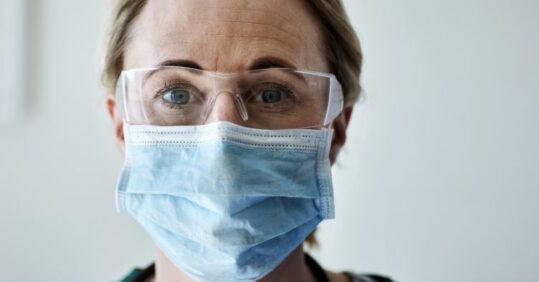Half of healthcare workers ‘struggling to cope’ during pandemic

Almost half of healthcare workers are struggling to cope mentally during the pandemic, a survey published yesterday has found, as calls for better mental health support grow.
The survey from Unison, carried out between 9 and 30 October, was of 14,004 UK employees – including nurses, occupational therapists and healthcare assistants – from hospitals, GP practices and other locations such as care homes.
It found that 48% of healthcare workers have not coped well mentally during the pandemic, with some describing issues such as feeling suicidal or experiencing panic attacks. Others said they feel helpless when supporting patients.
Related Article: ‘Patients not prisoners’: Palliative care nursing behind bars
Unison has called on the Government to ‘extend psychological support’ such as free 24-hour helplines to support staff experiencing burnout and ‘help avoid an exodus’ of staff leaving the profession.
The top reason respondents gave for not being able to cope was fear of sickness (60%), followed by being unable to socialise (55%), increased workload (49%), increased contact with very unwell patients (33%) and financial worries (23%).
Other factors included difficulty taking annual leave (17%), issues with employers over sick pay (8%), and having to live away from home to protect their family from the virus (8%).
Half of respondents (51%) have sought out mental health support – either from friends and family (77%), colleagues (58%), wellbeing apps (27%) and or professional counselling services (20%).
Financial concerns have added to the mental health strain for many, the report found.
Over a quarter (26%) of respondents said the pandemic had put themselves or their family under financial difficulties. Of these, 81% said these money worries had impacted their mental health.
Related Article: NHSE confirms dates and eligibility for autumn Covid and flu jabs
Half (52%) gave a range of reasons for their financial struggles, while some pinpointed a job loss in their household (28%), the fact they only received statutory sick pay (12%), reduced hours (12%), bereavement (9%) and redundancy (1%),
Unison head of health Sara Gorton said: ‘Many are exhausted with no let-up in sight given the increase in hospital admissions and backlog of cancelled treatments. Others are traumatised from seeing patients die before their time – no one can comprehend the toll this has taken.
‘Pay rates must rise soon or staff could leave. The government needs to step in to help the NHS hold on to people. That means supporting their mental health as well as their financial wellbeing.’
Unison and other unions including the RCN have been repeatedly calling for an early pay rise for staff covered by Agenda for Change including nurses.
Related Article: QICN bids farewell to Dr Crystal Oldman as she retires from CEO role
Earlier this month, data published by the International Council of Nurses found as many as 80% of nurses are reporting psychological distress because of the Covid crisis in some countries.

See how our symptom tool can help you make better sense of patient presentations
Click here to search a symptom




